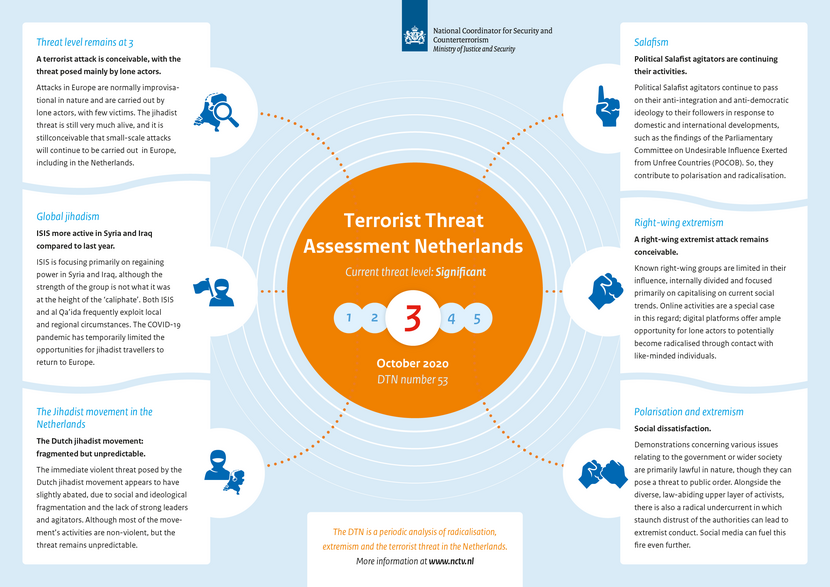NCTV Terrorist Threat Assessment: an attack is conceivable, with the threat posed mainly by lone actors
At present, there are individuals in the Netherlands who are becoming radicalised and those who are highly radicalised already and pose a threat. Although there are no indications that anyone in the Netherlands is planning an attack, it remains conceivable that this could be the case. Attacks in Europe are normally improvisational in nature and are carried out by lone actors, with few victims. The jihadist threat has by no means disappeared. For this reason the threat level has been maintained at 3 (on a scale of 1 to 5). These are some of the key conclusions of the 53rd edition of the Terrorist Threat Assessment for the Netherlands, published by the National Coordinator for Security and Counterterrorism (NCTV).
Sharp-edged, polarised debate
Since the coronavirus pandemic began, expressions of social dissatisfaction have increased, both online and offline. Some of the groups and individuals involved have found common ground rejecting the authorities or government policy. This sentiment is rooted less in ideological motives than in feelings of injustice, strong discontent or a different perception of reality. In addition, people who have a long-standing distrust of government, science and traditional media can now see their ideologies confirmed in conspiracy theories and disinformation. Social media play a facilitating and mobilising role in this regard and add further fuel to the fire. Alongside the diverse, law-abiding upper layer of activists, there is also a radical undercurrent in which staunch distrust of the authorities can lead to extremist conduct.
Threat of right-wing violence is conceivable
The COVID-19 pandemic and the measures taken by the authorities to keep the virus under control have not led to an increased threat from right-wing extremism in the Netherlands. Known groups are generally limited in their influence, internally divided and focused primarily on capitalising on current social trends. Online activities are a special case in this regard, however, as digital platforms offer ample opportunity for lone actors to potentially become radicalised through contact with like-minded individuals. A right-wing extremist attack remains conceivable primarily due to online developments.
Resurgence of ISIS in Syria and Iraq
ISIS has been more active in Syria and Iraq compared to last year. Following the collapse of the ‘caliphate’, the threat of an attack by ISIS has diminished, but not disappeared. ISIS still aspires to carry out attacks in European countries. As a result, the group is attempting to establish structures and networks in which sympathisers and adherents in Europe can play a role and come into contact with members of ISIS in Syria. The COVID-19 pandemic has temporarily limited the opportunities for jihadist travellers to return to Europe.
The jihadist movement in the Netherlands is fragmented but unpredictable
The immediate violent threat posed by the Dutch jihadist movement appears to have abated somewhat, as a result of social and ideological fragmentation, a lack of motivation and the absence of strong leaders and agitators. Most of the movement’s activities are non-violent, but the threat posed remains unpredictable. Some Dutch jihadists still seek to carry out an attack in the Netherlands. Vigilance is still required regarding lone actors from this movement. The next few years will be decisive for the jihadist movement. If it continues to disintegrate, this could lead to the movement shrinking and to a less receptive environment for jihadists returning to society from imprisonment. That means continued pressure from the authorities and unabated use of repressive measures can further this process.
Political Salafist agitators are continuing their activities
Agitators are attempting to strengthen their political standing by energising and mobilising their followers. This applies both to individual cases, such as showing solidarity with the imam of the as-Soennah mosque in The Hague or the dismissed former principal of the Cornelius Haga Lyceum (CHL) secondary school in Amsterdam, and to political issues such as the report by the Parliamentary Committee on Undesirable Influence Exerted from Unfree Countries (POCOB).
